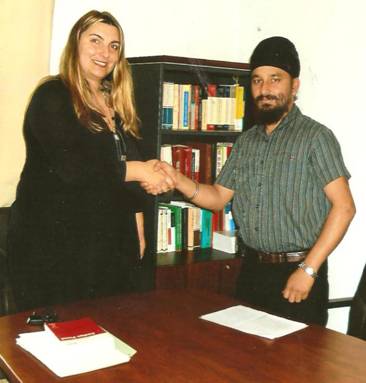To Get Involved, Click here and Join UNITED SIKHS
To receive forthcoming bulletins join our UNITED SIKHS Yahoo group
To donate go to www.unitedsikhs.org/donate
This Press Release may be read online at: http://www.unitedsikhs.org/PressReleases/PRSRLS-22-11-2008-00.htm
Press Release: 22nd Nov 2008, Tuesday 9 Maghar (Samvat 540 Nanakshahi )
Press Release
| Sikhs Raise Religious Freedom Issues in the Belgian Media |
Brussels, Belgium - UNITED SIKHS, in conjunction with Belgian Gurdwaras ( Places of worship), issued a statement airing concerns for religious freedom in Belgium, which was carried in full in a prominent Belgian daily newspaper, Le Soir, on 18 November 2008. This statement which was supported by Gurdwara Guru Nanak Sahib, Vilvoorde; Gurdwara Sangat Sahib, Sint-Truiden; Gurdwara Guru Ram Das, Hoepertinger; Guru Nanak Sikh Society, Sint-Truiden; Gurdwara Sahib Liège, addressed issues following a police raid a month earlier on the Sikh Gurdwara in Vilvoorde, which stopped the non-stop recitation of Sri Guru Granth Sahib Ji, the Sikh scriptures. The non-stop prayers were being conducted to celebrate the tercentenary of the enthronement of Sri Guru Granth Sahib Ji. Read about the raid at http://www.unitedsikhs.org/PressReleases/PRSRLS-19-10-2008-00.htm
"The Belgian constitution protects religious freedom and the government has a duty to ensure that all religious minorities enjoy the same rights as the religions practised by the majority," said Mejindarpal Kaur, UNITED SIKHS legal director who met the Mayor and Police Chief of Vilvoorde following the police raid.
Below is an English translation of the statement in Le Soir. The original French version of the statement in Le Soir may be read here.
For the adoption of a coherent policy adapted to the issue of religious minorities
Tuesday 18 November 2008, 08:42
The police raid at the Vilvoorde Sikh temple (Gurdwara) on 19 October 2008 has generated a notable interrogation in our community: do we have to be a "recognised" religion to get respect for our specificity in Belgium? A place of a so-called "recognised" religion, such as a church, a mosque, a synagogue, a protestant temple or a Masonic temple would not have been raided. The "recognition" which is a simple discretionary political decision, which gives access to funding, should not have any incidence on the rights that every religion and every practicing believer gets from the Constitution and the ECHR (European Convention on Human Rights) , which does not distinguish between "recognised" religions and the others.
Our religion, founded in the 15th century by Guru Nanak, is monotheist and preaches a message of understanding and peace and total equality of men and women before god, whatever be notably their religion and race, including in religions functions. The social conscience and service to humanity are part of the fundamental principles of Sikhism.
We are very honoured that His Majesty, the King Albert II and his wife, Her Majesty, the Queen Paola, accompanied by several Belgian personalities could, during their official visit to India, be welcomed in a historical Sikh Gurudwara of the 17th century, Bangla Sahib at New Delhi. It is for us, a great honour which makes us proud and touches us. (You may read an article in Le Soir on the Belgian King and Queen's visit to Bangla Sahib here. The English translation can be read here.)

Belgian King and Queen's visit on 5 nov 2008 to historical 17th century Sikh Gurdwara Bangla Sahib, New Delhi During the Partition of India, the Sikhs were caught between the Muslim and Hindu communities, a source of several difficulties and the cause of waves of emigration and independence movements.
Belgium is a land of hospitality and it is for this reason and because of historical links that the Sikhs have chosen to become citizens and residents of Belgium. During the two world wars, 80,000 Sikhs died on the battlefield including 35,000 at Ypres. We are proud that the Sikhs severed the cause of liberty and justice in Europe and Belgium. We do not want this fight for justice and liberty to go in vain. We also wish to express the profound respect that we have for the laws and values that govern Belgium and our desire to be its loyal citizens.
The Sikh community counts between 5,000 and 10,000 representatives in Belgium and has four Gurdwaras. The 19 October police raid in the Vilvoorde Gurdwara has wounded a pillar of our religion, which is particularly proud of its long tradition of hospitality and aid to the poorest, without discrimination.
In each Gurdwara, a community kitchen prepares and serves food to the visitors ("langar").
It is especially painful for us that some people associate this institution with criminal activities. The forces of order ignored that in a Gurdwara, one should cover the head and remove one's shoes. The most important recitation of the year was interrupted. We are extremely hurt by the fact that nothing was foreseen on this issue and that the police did not find a way to proceed that would respect our traditions.
The reason for this is that in Belgium, there is no framework ensuring effective organisation and protection in the public sphere of this religious freedom. There isn't any representative authorised nor any channel of communication privileged between the government and the unrecognised religious minorities.
Not being a "recognised" religion causes us other difficulties. In a Gurdwara, extracts of our Sacred Scriptures, Sri Guru Granth Sahib Ji must be read everyday, requiring the permanent presence of a "granthi" (a person who conducts prayers).
Visas for these "ministers of faith" are reserved for the ministers of "recognised" faiths, which is not in accordance with the Constitution and the ECHR.
This might, in Belgium, lead to a decline in our practice, which is the vigilant support for our moral values and the guarantee of our loyalty and our attachment to Belgium.
Wearing the turban, which covers our uncut hair, is a requirement of our faith and is part of our dignity and identity. The ban on "ostensible" religious symbols in certain schools forces our adolescents to resign themselves to cutting their hair, to keep them long or change school and travel for long distances to be accepted. The custom checks in Belgium force Sikhs to remove their turban. In most of the other countries, the checks are carried out in a more respectful manner. However, it is wearing the turban that the soldiers of the Sikh regiment fought during the two world wars in Europe. It is thus covered with a light blue turban that the Sikhs serve in the peacekeeping forces of the United Nations at all moments.
The diversity in the domain of religious expression must not hide the profound convergence of fundamental values. Respect for differences in the private as well as public spheres can in our opinion only help in maintaining and reinforcing this unity.
Knowing us and understanding us better contributes to this desire to hold high the fundamental values that constitute the common basis of humanity. Mutual cognizance is the incontestable guarantee for respect and understanding. Our Tenth Guru recommends that we "recognise the human race as one."
We thus hope, respected sir, for the adoption of a clear, coherent and adapted policy, in accordance with the Constitution and the ECHR in the matter of religious minorities, an improvement of relations and exchange of information on this issue, which would avoid certain difficulties and recourse to courts to assert the fundamental rights and to put an end to all ambiguity between the rights of the so-called "recognised" religions and the others.
We would like to thank you on behalf of all the Sikhs in Belgium.
Issued By:
Gurpreet Singh
ICHRA
UNITED SIKHS
Phone: +44 7709830442
Email: law@unitedsikhs.org
Our Mission
To transform underprivileged and minority communities and individuals into informed and vibrant members of society through civic, educational and personal development programs, by fostering active participation in social and economic activity.
UNITED SIKHS is also an avenue for networking between like-minded organisations to establish and nurture meaningful projects and dialogues - whether social, cultural or political- to promote harmony, understanding and reciprocity in our villages, towns and cities.
UNITED SIKHS is a coalition of organisations and individuals, who share a common vision based on the belief that there is no greater endeavour than to serve, empower and uplift fellow beings. The core of our philosophy is an unwavering commitment to civic service and social progress on behalf of the common good.
Accordingly, UNITED SIKHS has sought to fulfil its mission not only by informing, educating and uplifting fellow beings but also by participating in cross-cultural and political exchanges to ensure that the promises and benefits of democracy are realized by all.
We at UNITED SIKHS believe that the development of enlightened and progressive societies can be made possible by socially conscious groups of people who make a commitment to develop and direct human potential. Our work, efforts and achievements stand as a testament to our faith in this vision.




 Hazur Sahib, October 26
Hazur Sahib, October 26



